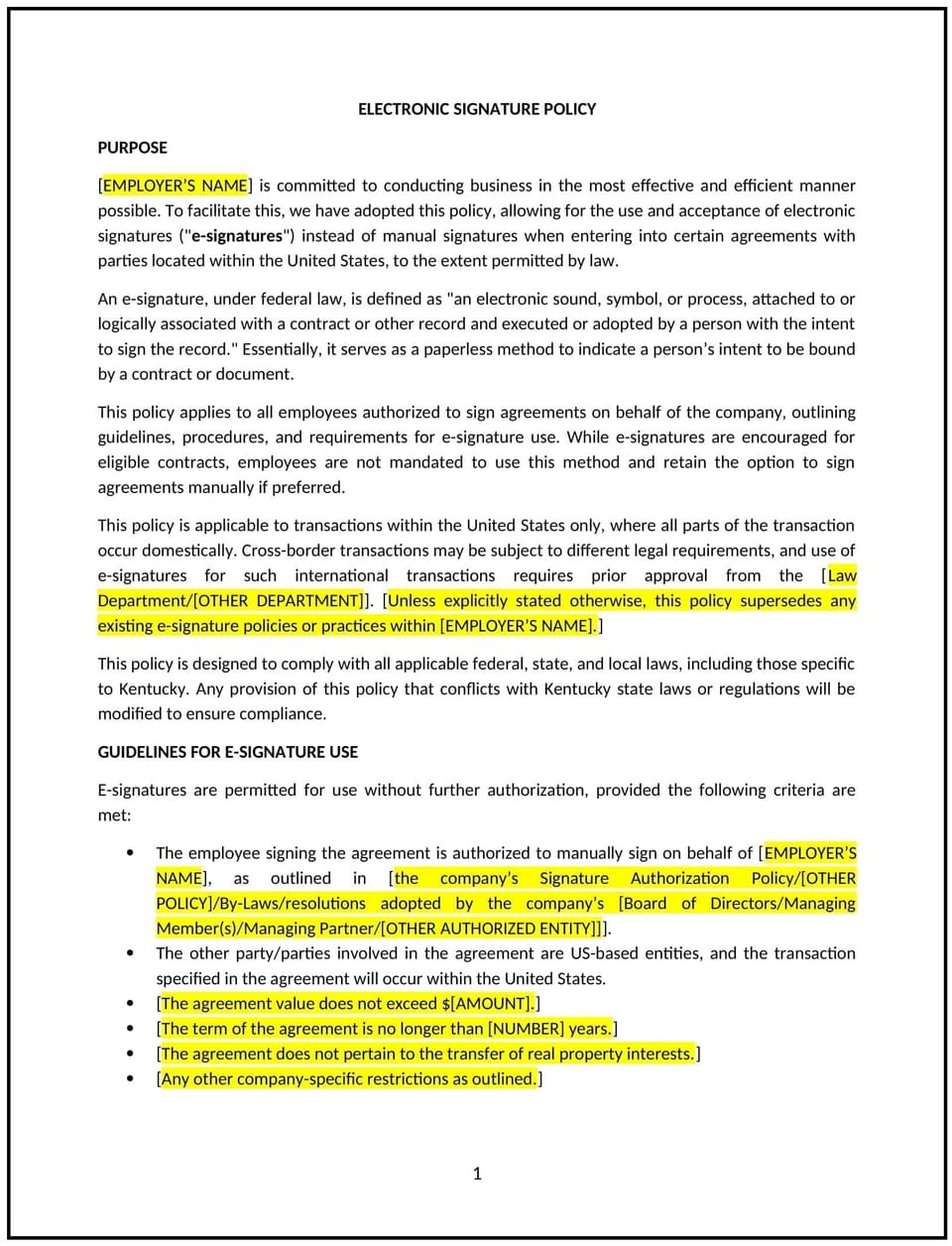Electronic signature policy (Kentucky): Free template

Electronic signature policy (Kentucky)
An electronic signature policy provides Kentucky businesses with guidelines for using electronic signatures in place of traditional handwritten signatures. This policy ensures that electronic signatures are legally valid, secure, while supporting compliance with state and federal laws, including the Uniform Electronic Transactions Act (UETA) and the Electronic Signatures in Global and National Commerce Act (ESIGN).
By adopting this policy, businesses can streamline their operations, reduce paperwork, and enhance security and efficiency in signing agreements and contracts.
How to use this electronic signature policy (Kentucky)
- Define electronic signatures: Clearly explain what constitutes an electronic signature, including typed names, scanned signatures, and digital signatures that meet legal requirements.
- Outline acceptable use cases: Specify the types of documents and agreements where electronic signatures are allowed, such as contracts, employee agreements, and purchase orders.
- Specify signature requirements: Detail the security measures required to authenticate electronic signatures, such as multi-factor authentication, encryption, or trusted signature platforms.
- Ensure compliance with legal standards: Outline the applicable laws and regulations that govern electronic signatures, including UETA, ESIGN, and Kentucky-specific rules.
- Address record-keeping: Describe how electronically signed documents will be stored, tracked, and archived to ensure they are legally enforceable.
- Include employee responsibilities: Clarify the process employees must follow when signing documents electronically, including verification steps and ensuring they understand the legal implications of their electronic signature.
- Provide guidelines for third-party agreements: If applicable, outline the process for obtaining electronic signatures from external parties, such as clients or contractors.
Benefits of using this electronic signature policy (Kentucky)
This policy provides several advantages for Kentucky businesses:
- Increases efficiency: Reduces the time and resources spent on printing, scanning, and mailing documents for signatures.
- Enhances security: Uses encrypted and secure methods to validate signatures, reducing the risk of fraud or unauthorized alterations.
- Supports compliance: Ensures that electronic signatures comply with applicable state and federal regulations, making them legally binding.
- Promotes sustainability: Reduces paper usage, aligning with environmental goals and contributing to corporate social responsibility.
- Improves business processes: Streamlines contract management and approval workflows, improving productivity and collaboration.
Tips for using this electronic signature policy (Kentucky)
- Communicate the policy: Ensure employees are aware of the policy during onboarding and through regular reminders about the proper use of electronic signatures.
- Use trusted platforms: Implement secure, reputable e-signature software to ensure the authenticity and legality of signed documents.
- Monitor compliance: Regularly review electronic signature practices to ensure they are being applied consistently and in accordance with the policy.
- Train employees: Provide training on the legal implications of electronic signatures and the importance of secure document handling.
- Review periodically: Update the policy to reflect changes in Kentucky laws, electronic signature technologies, or business needs.
Q: What is the purpose of an electronic signature policy?
A: The policy establishes guidelines for using electronic signatures to ensure they are legally valid, secure, and compliant with applicable laws.
Q: When can electronic signatures be used?
A: Electronic signatures can be used for various documents, including contracts, agreements, and internal forms, as specified in the policy.
Q: What security measures are required for electronic signatures?
A: The policy outlines security measures such as multi-factor authentication, encryption, or using trusted e-signature platforms to authenticate signatures.
Q: Are electronic signatures legally valid?
A: Yes, electronic signatures are legally valid and enforceable in Kentucky if they comply with UETA, ESIGN, and other relevant regulations.
Q: How are electronically signed documents stored?
A: The policy specifies how electronically signed documents will be securely stored and tracked for future reference and legal purposes.
Q: Do employees need special training for electronic signatures?
A: Yes, employees should be trained on the proper use of electronic signatures, the security protocols, and the legal implications of their use.
Q: How often should the electronic signature policy be reviewed?
A: The policy should be reviewed regularly, at least annually, to ensure it complies with changes in Kentucky laws and best practices for electronic signature technologies.
This article contains general legal information and does not contain legal advice. Cobrief is not a law firm or a substitute for an attorney or law firm. The law is complex and changes often. For legal advice, please ask a lawyer.


